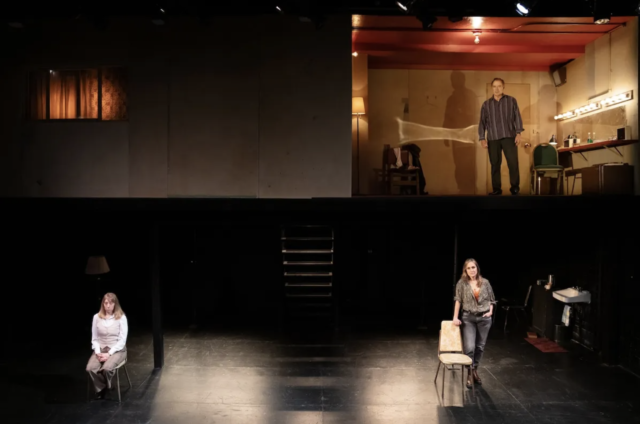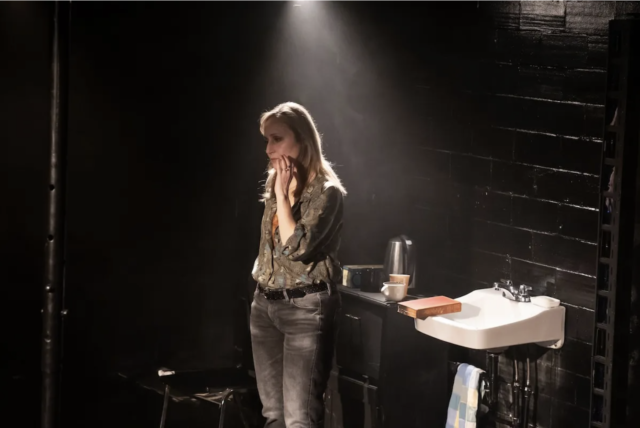
Caroline (Crystal Finn), Alice (Heather Raffo), and Caroline’s Father (Kurt Rhoads) explore an incident from their past in Munich Medea: Happy Family (photo © Julieta Cervantes)
MUNICH MEDEA: HAPPY FAMILY
WP Theater
2162 Broadway between Seventy-Sixth & Seventy-Seventh Sts.
Through February 25, $30-$100
wptheater.org
An undercurrent of Greek tragedy winds its way through Corinne Jaber’s debut, Munich Medea: Happy Family, a compelling but ultimately unsatisfying drama.
The seventy-five-minute play is told in a series of monologues delivered to the audience by Alice (Heather Raffo), her childhood bestie, Caroline (Crystal Finn), and Caroline’s Father (Kurt Rhoads), a well-known stage actor. They each have their place on Kristen Robinson’s two-level set: Alice stays on the right side, which has a chair and a sink; Caroline is on the left, with a chair and a bench; and Father hovers over them literally and figuratively, his curtained private room in his house above his daughter, his open theater dressing room above Alice. A staircase looms in the back middle, separating all three characters except when Father, who has been sleeping with Alice since the girls were sixteen, comes down.
They all live in Germany, where Father is starring as Jason in a production of Medea, the character who cheats on his wife, their two young children paying the price for his infidelity.
“When I got to the theater the show had already started / I waited / And watched / Jason abandon his wife / And Medea plot on vengeance / Torn by pain, all of them / Too much love, I thought,” Alice says.
Alice initially believes she is a willing participant in the sordid proceedings, while Father is unrepentant: “Why did you tell them about our secrets? Why share things with them that they cannot understand? / Throwing pearls in front of sows / Why tell them what is precious and daring and other? / This otherness that disrupts their little middle-class lives / That scares them / And fascinates them / Why? / When I was here to protect you / To hold on to our stories / To hold on to this world of ours / To not let them tear it apart / We need to shield ourselves from them / We are not like them / We are made from other stock.”
Meanwhile, Caroline recalls her terror of Father, with good reason. She remembers, “My mother would go to bed very early / Once my sister had been put to sleep / My father was at the theater / And when he wasn’t / He was in his room / His sanctuary, as he called it / Locked up / Not to be disturbed / His room next to my room / Far away from my parents’ bedroom / His room where he worked his lines and read / I’d hear him recite / Loud and strange noises / And then go quiet again / I don’t really know what he did in there / I was frightened by the mysterious room / And his presence next to me / Invisible / At eight pm he’d watch the Sportschau / I could always hear the introductory tune of the Sportschau / I hated that tune / It meant that we were alone now / My father with his television and me with my book in bed / Only a wall between us / All I wanted was to be at the other end of the corridor / Where my mother was / In another world / A world of happy family / I still don’t know what that is / Happy family / But it does exist / I know it does.”

Alice (Heather Raffo) reevaluates the past in debut play by Corinne Jaber (photo (© Julieta Cervantes)
Father quotes Friedrich Schiller, Georg Büchner, and Rainer Maria Rilke, cleans his feet as if he is some kind of Jesus, and insists that anyone in his situation would have done the same thing; he defends his love of Alice by using Jason’s words, specifically misogynistic ones at that: “There should be some other way for men to produce children. Women would not have to exist at all. And then humanity would be saved a lot of trouble.”
Twenty years after everything went down, Alice and Caroline meet up again, but they still speak only to the audience and never to each other. Throughout, there is not a single scene in which the characters interact.
Munich Medea: Happy Family is a coproduction of PlayCo and WP Theater, the latter specializing in the work of Women+. The title is misleading; it feels like the play could have been set anywhere, not necessarily in Germany, and the Medea references might make one expect a different kind of ending.
Finn (Birthday Candles, Plano) ably portrays the tightly wound Caroline, Rhoads (Julius Caesar, Off Peak) is appropriately beastly as Father, and Raffo (Noura, 9 Parts of Desire) is riveting as Alice, but Jaber and director Lee Sunday Evans (Oratorio for Living Things, Dance Nation) can’t bring the disparate parts together. Just as the characters never connect onstage, the play never connects with its title or its promise and feels strangely unfulfilled, neither adding to the contemporary dialogue surrounding sexual abuse nor adequately exploring its namesake’s theme of parents killing their children with their own unbridled desire.
[Mark Rifkin is a Brooklyn-born, Manhattan-based writer and editor; you can follow him on Substack here.]